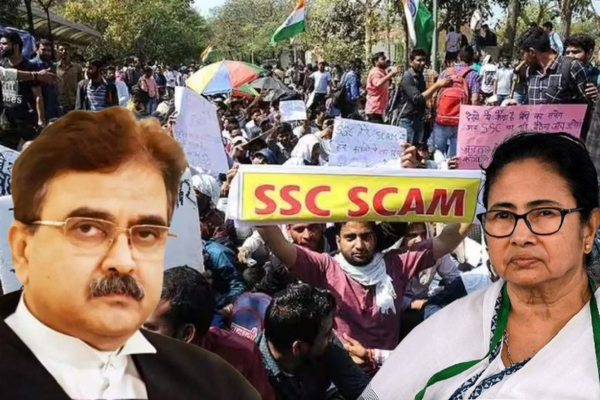
Table of Contents
Introduction
On April 3, 2025, the Supreme Court of India delivered a landmark judgment regarding the West Bengal SSC Recruitment Scam/ West Bengal School Service Commission (WBSSC) recruitment scam of 2016, cancelling 26,000 appointments made through fraudulent means. The verdict sent shockwaves across the state, affecting thousands of candidates, educators, and the political landscape of West Bengal.
The case, which had been under judicial scrutiny for years, exposed deep-rooted corruption in the recruitment process for teachers and non-teaching staff in state-run schools. The apex court’s decision upheld the findings of earlier investigations, reinforcing the need for transparency and meritocracy in government recruitments.
This article delves into the background of the scam, the legal proceedings, the Supreme Court’s verdict, its implications, and the political fallout in West Bengal.
Background of West Bengal SSC Recruitment Scam 2016
1. The 2016 Recruitment Process
The West Bengal School Service Commission (WBSSC) conducted recruitment examinations in 2016 for various teaching and non-teaching positions in state government schools. The process was meant to fill vacancies for:
- Assistant Teachers (Madhyamik & H.S)
- Group C & D Staff
Thousands of candidates appeared for the examinations, hoping to secure stable government jobs. However, allegations of irregularities soon surfaced.
2. Emergence of Corruption Allegations
By 2019, reports of bribery, manipulation of merit lists, and fake appointments began circulating. Key allegations included:
- Leakage of answer sheets
- Tampering with OMR sheets
- Bribes taken by officials to manipulate rankings
- Appointment of ineligible candidates
Several petitions were filed in the Calcutta High Court, demanding a Central Bureau of Investigation (CBI) probe.
3. Calcutta High Court’s Intervention
In 2021, the Calcutta High Court ordered a CBI investigation, which uncovered:
- Fake recommendations issued by WBSSC officials.
- Names of candidates who never appeared for exams in the final list.
- Money exchanged for jobs, with some appointments sold for ₹5-10 lakhs.
In 2022, the High Court canceled all 26,000 appointments, calling the process “illegal and void.” The West Bengal government challenged this decision in the Supreme Court.
Supreme Court’s Verdict: Key Highlights (April 3, 2025)
1. Upholding the High Court’s Decision
The Supreme Court bench, headed by Chief Justice of India (CJI), upheld the Calcutta High Court’s order, stating:
“The recruitment process was vitiated by fraud and corruption. Appointments made on the basis of such malpractice cannot be sustained.”
2. Cancellation of 26,000 Jobs
The court directed:
- Immediate termination of all illegally appointed candidates.
- Recovery of salaries from those who secured jobs fraudulently.
- Fresh recruitment process under strict supervision.
3. Legal Consequences for Culprits
The SC ordered:
- Criminal prosecution of WBSSC officials, politicians, and middlemen involved.
- Fast-track trials to ensure swift justice.
4. Compensation for Genuine Candidates
The court acknowledged that meritorious candidates were deprived of opportunities and recommended:
- Priority consideration in future recruitments.
- Monetary compensation for those who suffered due to delays.
Implications of the Judgment
1. Impact on Appointed Candidates
- 26,000 employees, many of whom had been working for nearly a decade, lost their jobs overnight.
- Families dependent on these jobs faced financial crises.
2. Administrative Overhaul in WBSSC
- The entire recruitment mechanism will be restructured.
- Digital and biometric verification may be introduced to prevent fraud.
3. Political Repercussions in West Bengal
- The ruling Trinamool Congress (TMC) faced severe backlash.
- Opposition parties (BJP, CPI(M), Congress) demanded resignation of Education Minister.
- Public protests erupted across the state.
4. Precedent for Other States
- The judgment sets a legal benchmark for handling recruitment scams.
- States like Bihar, Uttar Pradesh, and Rajasthan may revisit their recruitment policies.
Public and Political Reactions
1. Government’s Response
- Chief Minister Mamata Banerjee called the verdict “unfortunate” but assured compliance.
- The state announced a new transparent recruitment policy.
2. Protests by Affected Candidates
- Job losers staged dharnas and road blockades.
- Some demanded re-verification instead of mass termination.
3. Opposition’s Criticism
- BJP accused TMC of institutionalizing corruption.
- Left Front demanded a judicial commission to probe deeper into the scam.
Way Forward
1. Fresh Recruitment Process
- The WBSSC must conduct new exams within six months.
- Strict monitoring by retired judges to ensure fairness.
2. Legal Reforms Needed
- Stronger anti-corruption laws for public service recruitment.
- Whistleblower protection for those exposing scams.
3. Lessons for Job Seekers
- Candidates must avoid shortcuts and rely on merit.
- Public awareness campaigns on legal recruitment processes.
Conclusion
The Supreme Court’s verdict on April 3, 2025, marks a historic moment in India’s fight against corruption in government recruitments. While the cancellation of 26,000 jobs brings justice to deserving candidates, it also highlights systemic failures in West Bengal’s education sector.
The judgment serves as a warning to corrupt officials and politicians while reinforcing the judiciary’s role in upholding integrity in public employment. Moving forward, transparency, accountability, and technology-driven recruitment must be prioritized to restore public trust.
FAQs
Q1. Why did the Supreme Court cancel 26,000 jobs?
A1. Due to large-scale corruption, manipulation of merit lists, and illegal appointments in the 2016 WBSSC recruitment.
Q2. What happens to candidates who lost their jobs?
A2. They will be terminated immediately, and genuine candidates may get priority in future recruitments.
Q3. Will there be legal action against the culprits?
A3. Yes, the CBI will prosecute WBSSC officials, middlemen, and politicians involved.
Q4. What is the political impact of this verdict?
A4. The TMC government faces severe criticism, while opposition parties gain momentum.
Q5. How can such scams be prevented in the future?
A5. By implementing digital exams, biometric verification, and independent oversight.
